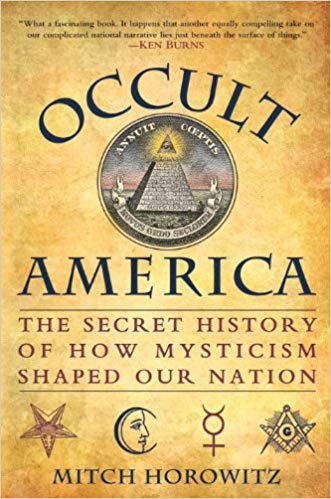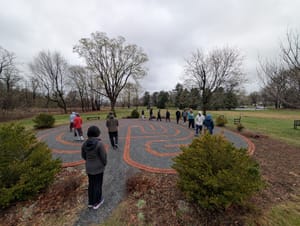
I was under the weather the entire first week of July, so I spent July 4 in bed, reading this book by Mitch Horowitz. Published in 2009, Occult America is an entertaining survey of a variety of “occult” religious trends that blossomed over three centuries of American history.
Horowitz starts his account with the arrival of the Shakers, a somewhat controversial choice since the Shakers weren’t especially “occult,” even by Horowitz’s very broad definition: A belief in a mysterious, hidden world that controls what happens in the visible world, and which can be used to understand or control the visible world in ways that aren’t accessible to most of us. But it’s a good point to start the discussion of enthusiastic, sometimes radical outbreaks of charismatic, contagious spiritualism.
In subsequent chapters, Horowitz covers 18th-century spiritualism and Freemasonry; 19th-century Theosophy and Mormonism; the self-reliant spiritualism of Booker T. Washington and Marcus Garvey; African-American hoodoo; Wicca, Ouija boards, tarot, and mail-order spiritual supply houses; Manly P. Hall; and the rise of the New Age.
Occult America makes a persuasive argument that many of these movements were closely linked with women’s suffrage, abolitionists, and other progressive causes, and that as a result they had a substantial impact on the development of this country’s values, politics, and government. The fact that many of these movement were founded by women and/or included many women in leadership positions is no coincidence. (Side note: A research paper by Mary Bednarowski (.pdf), from the 1990s, found some interesting parallels between various outside-the-mainstream groups’ theologies and the leadership role of women.)
Some tidbits of interest:
The “Shaker formulation”: “Keep hands to work even as hearts soar to God”
Madame Helena Blavatsky and her companion Colonel Henry Steel Olcott were not just the founders of Theosophy, but also played a huge role in defending Hindu and Buddhist practices from colonialism, in India as well as in Sri Lanka and elsewhere. Blavatsky: “The Theosophical Society means, if it cannot rescue Christians from modern Christianity, at least to aid in saving the ‘heathen’ from its influence.” [p. 47]
Poet James Merrill’s book The Changing Light at Sandover was composed in part with a Ouija board, which Merrill and his partner were so obsessed with that Truman Capote referred to their house as “Creepyville.” Ted Hughes and Sylvia Plath also experimented with Ouija-based poetry composition, less successfully it appears. Merrill, on the reality of spirit communication:
“If it’s still yourself that you’re drawing upon,” he said, “then that self is much stranger and freer and more far-seeking than the one you thought you knew.” And at another point: “If the spirits aren’t external, how astonishing the mediums become!” [p. 79]
Frederick Douglass’s escape from slavery was aided in part by a mysterious man he met in the woods, “Sandy,” who gave him a root (called “John the Conqueror” or “John de Conker”) that, he said, would make him impossible to beat in hand to hand combat. The next day, Douglass resisted the slavemaster and fought him to a standoff. The incident gave Douglass a sense of inner confidence and power: “I now resolved that, however long I might remain a slave in form, the day had passed forever when I could be a slave in fact.” [pp. 120-121]
“Man has been an alchemist from the time when first he raised himself,” [Manly] Hall wrote. “… Experiences are the chemicals of life with which the philosopher experiments.” [p. 152]
The word “science” was used by New Thought advocates and mentalists like Phineas T. Quimby, as well as Marcus Garvey, to connote magical practices. But it also indicated that certain practices were deterministic, and could be used to better oneself: “Get you[reself], as the white man has done, a scientific understanding of God and religion,” Garvey told a Jamaican audience in 1928. [p. 135-136]


